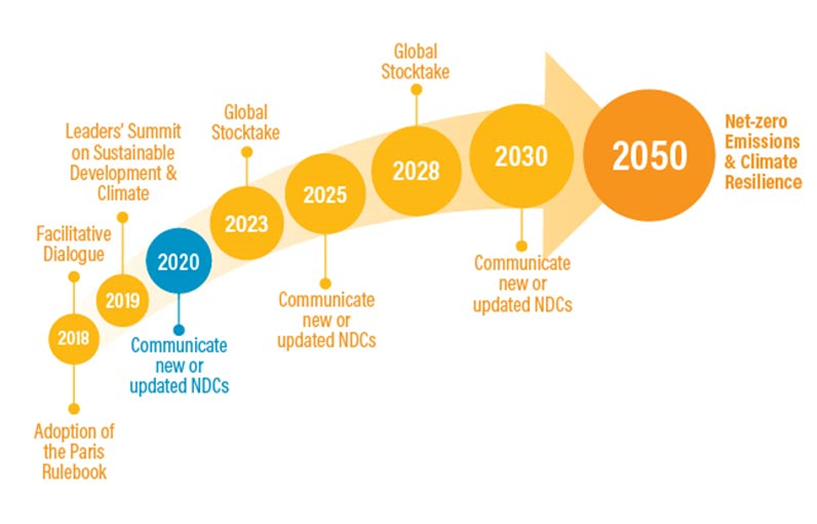Nationally Determined Contributions (NDCs)
In the run-up to the COP21, parties to the UNFCCC conceived Intended Nationally Determined Contributions (INDCs) as a means for countries to communicate the steps they will take to address climate change. INDCs reflected the level of ambition by each country in reducing emissions, taking into account its national circumstances and capabilities.
The Paris Agreement implementation framework calls for countries to submit new, revised and enhanced NDCs starting in 2020, and every five years thereafter. In addition, the Agreement requires parties to participate in a global stocktaking of progress in the reduction of global CO2 emissions every five years, starting in 2023. This ambition mechanism is depicted below.

Source: https://www.wri.org/publication/ndc-enhancement-by-2020
In 2015, ACPC developed a framework to support Africa countries in formulating their INDCs for submission to the UNFCCC. In this context, the Centre provided direct support to Eswatini, Malawi, Cameroun and Liberia to engage climate sensitive sectors, policy makers and other stakeholders, and to apply the ECA developed framework to develop INDCs. Almost all African countries (53 out of 54, Libya being the exception) submitted their INDCs. Subsequent to the December 2015 Paris conference, the submitted INDCs transition into the baseline NDCs for each country.
In a workshop of NDC national focal points in Africa convened by ACPC in March 2018, the overwhelming takeaway and outcome as communicated by participants was that INDCs submitted to the UNFCCC were overly ambitious, and that sufficient consultations with all stakeholders did not take place in most countries.
Since 2019, ACPC in collaboration with regional institutions, the NDC hub and the NDC partnerships, has embarked on a structured process for assisting member states in revising their NDCs. The ongoing support has been demand led and includes revision of NDCs for Liberia, Zimbabwe, Togo and Cameroun. Although the specific areas of support vary from country to country, the cross-cutting thread has been consultations among stakeholder groups such as climate sensitive sectors (agriculture, energy, water, transport), policy makers, academics, youth and women, and alignment of NDCs with national development plans.
